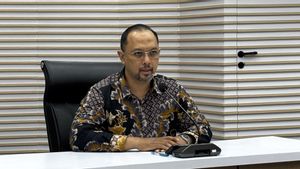JAKARTA - The performance of the Task Force for Handling State Collection Rights for the Bank Indonesia Liquidity Assistance Fund (BLBI Task Force) is disappointing. The reason is, the value of state losses that have been saved is very small and still far from expectations. This figure is not comparable to the costs incurred by the state to fund the activities of this BLBI Task Force.
"Frankly, it's a bit disappointing to see the results of the BLBI task force. Even though the time (work period of the BLBI-ed Task Force) is quite long," said anti-corruption activist who is also a legal observer, Hardjuno Wiwoho in Jakarta, Wednesday, August 21.
It was recorded that until the first semester of 2024, the BLBI Task Force had recorded the acquisition of ex-BLBI assets of 44.7 million square meters and non-tax state revenue (PNBP) of Rp. 38.2 trillion. This means that 34.59 percent of state collection rights have been successfully returned by the BLBI Task Force from liabilities of Rp. 110.45 trillion.
Hardjuno said that the achievement of the performance of the BLBI Task Force was far from expectations. This means that since it was formed in 2021, the BLBI Task Force has not yet reached 50 percent of its obligations.
This proves that the BLBI problem is quite complex, namely the combination of moral hazards for parties involved and attracting strong political economic interests in the case.
"The fact that BLBI used to be given to debtors in cash, while the amount of cash collected by the BLBI Task Force was only Rp. 1.5 trillion, clearly not according to public expectations," he explained.
Hardjuno, BLBI, which was originally given in the late 1990s to save national banks, should have been returned with the same results. However, after years of billing efforts, the cash funds that were collected were far from expectations.
Most of the confiscated assets were property and collateral whose monetary value had not been fully realized.
"The conversion of non-cash assets into funds that can be directly used by the state should be a priority. Without it, the result will only be a collection of assets that are not necessarily easy to monetize," said Hardjuno.
Even more worrying, when calculating interest by 6 percent per year from January 1998 to 2024, the value that should have been returned by debtors was around Rp502.48 trillion. This means that it is not only the subject of BLBI that has not been billed, but also the interest which continues to grow for more than 26 years.
"With interest that has reached hundreds of trillions of rupiah, it can be seen how much state losses are if this problem is not resolved immediately," added Hardjuno.
SEE ALSO:
With the BLBI Task Force's tenure which will end in December 2024 and the change of power from President Jokowi to Prabowo Subianto scheduled for October, serious concerns arise about the fate of BLBI debt collection. Each change of leadership carries the risk of policy changes and priorities, which can affect the sustainability of this BLBI settlement effort.
"If the new government does not provide full support, there is a risk that efforts to recover BLBI funds will stop or lose momentum," said Hardjuno.
Hardjuno also emphasized the importance of the new government to ensure that solving the BLBI problem remains a top priority. With around Rp72.25 trillion unpaid, and the value that should have been returned including interest reaching Rp502.48 trillion, efforts to return this people's money must continue to be encouraged.
"Without a strong commitment from all parties, the achievement of the BLBI Task Force may only become a historical record without a real impact on state finances and people's welfare," Hardjuno concluded.
The English, Chinese, Japanese, Arabic, and French versions are automatically generated by the AI. So there may still be inaccuracies in translating, please always see Indonesian as our main language. (system supported by DigitalSiber.id)
















